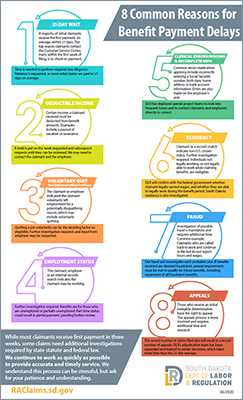Eight Common Reasons for Benefit Payment Delays
Waiting on your unemployment insurance payment? This could be why…
While some applicants simply are not eligible to receive unemployment, others have to wait longer than normal until an investigation of the claim is completed. The investigation process is required by state statute and federal law.

Eight common reasons why your unemployment insurance benefit payment may not have arrived, yet [Infographic (Adobe PDF)]:
Processing Time: The top reason claimants contact the Customer Service Center, many within the first week of filing, is to check on payment. Time is needed to perform due diligence required by state and federal laws. Patience is requested, as the RA Division continues to work as quickly as possible.
Deductible Income: Certain income a claimant received must be deducted from benefit amounts. Examples include a payout of vacation or severance. A hold is put on the week requested and subsequent requests until they can be reviewed. We may need to contact the claimant and the employer.
Voluntary Quit from Employment without Good Cause: The claimant or employer indicated the claimant voluntarily left employment for a potentially disqualifying reason, which may include voluntarily quitting. Quitting a job voluntarily can be the deciding factor on eligibility. Further investigation required, and input from employer may be requested.
Employment Status: The claimant, employer or an internal records search indicates the claimant may be working. Further investigation required. Benefits are for those who are unemployed or partially unemployed. Part-time status could result in partial payment, pending further review.
Clerical Errors/Missing and Incomplete Information: Common errors made when applying include incorrectly entering a Social Security number, birth date, home address or bank account information. Errors are also made on the employer’s end. DLR has deployed special project teams to look into frequent issues and to contact claimants and employers directly to correct.
Residency: Claimant or a records match indicate non-U.S. citizen status. Further investigation required. Individuals not legally working, or not legally able to work while claiming benefits, are ineligible. DLR will confirm with the federal government whether claimant legally earned wages, and whether they are able to legally work during the benefit period. South Dakota residency is also investigated.
Fraud: Investigation of possible fraud is mandatory and requires additional time. Common example: Claimants who are called back to work and continue to file but do not report hours and wages. Our fraud unit investigates each probable case. If benefits received are deemed fraudulent, several requirements must be met to qualify for future benefits, including repayment of all fraudulent benefits.
Appeals: Those who receive an initial ineligible determination have the right to appeal. The appeals process is more involved and requires additional time and research. The record number of claims filed also will result in a record number of appeals. DLR’s adjudication team has been expanded and trained to render decisions, which takes more time than the 21-day average.
Bottom line: Claims requiring additional investigation can stem from simple clerical errors to more complex deductible income and job separation issues. We are committed to working as quickly as possible while upholding program integrity.
